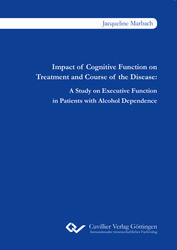| Areas | |
|---|---|
| Serie de libros (97) |
1382
|
| Nachhaltigkeit |
3
|
| Gesundheitswesen |
1
|
| Letra |
2372
|
| Medienwissenschaften | 16 |
| Teología | 57 |
| Filosofía | 102 |
| Derecho | 423 |
| Economía | 853 |
| Ciencias sociales | 417 |
| Ciencias del deporte | 48 |
| Psicología | 233 |
| Educación | 190 |
| Historia | 183 |
| Arte | 111 |
| Ciencias culturales | 166 |
| Literatur | 117 |
| Lingüística | 89 |
| Ciencias Naturales |
5408
|
| Ciencias Ingeniería |
1798
|
| General |
98
|
|
Leitlinien Unfallchirurgie
5. Auflage bestellen |
|
Erweiterte Suche
Impact of Cognitive Function on Treatment and Course of the Disease (Tienda española)
A Study on Executive Function in Patients with Alcohol Dependence
Jacqueline Marbach (Autor)Previo
Indice, PDF (99 KB)
Lectura de prueba, PDF (130 KB)
Chronic alcohol use is stated to be associated with cognitive and behavioural deficits. Alcohol-dependent individuals seem to have difficulties specifically in the cognitive abilities they need the most to recover from addiction and to cope with everyday demands; particularly executive functioning. This study demonstrates the challenge of assessing fundamental features of executive function in alcohol-dependent patients. The main strength of this study was the application of two different methods to explore their validity in the assessment of cognitive and behavioural aspects of executive function in terms of treatment outcome and long-term functional difficulties at a six-month follow up. Both the psychometrically assessed performance-based executive function deficits (EFDs) and the behavioural questionnaire, which refers to real-world behavioural manifestations of EFDs were of critical interest in terms of addictive behaviour and social and occupational functioning. The findings of this study proposed that the two methodological approaches could be capturing different aspects of executive function, and that self-reported behavioural manifestations of EFDs can help identify alcohol-dependent individuals at high risk for relapse.
| ISBN-13 (Impresion) | 9783736994249 |
| ISBN-13 (E-Book) | 9783736984240 |
| Formato | A5 |
| Idioma | Inglés |
| Numero de paginas | 182 |
| Edicion | 1. Aufl. |
| Lugar de publicacion | Göttingen |
| Lugar de la disertacion | Zürich |
| Fecha de publicacion | 05.12.2016 |
| Clasificacion simple | Tesis doctoral |
| Area |
Psicología
|
| Palabras claves | cognitive abilities, Alcohol-dependent, performance-based |








